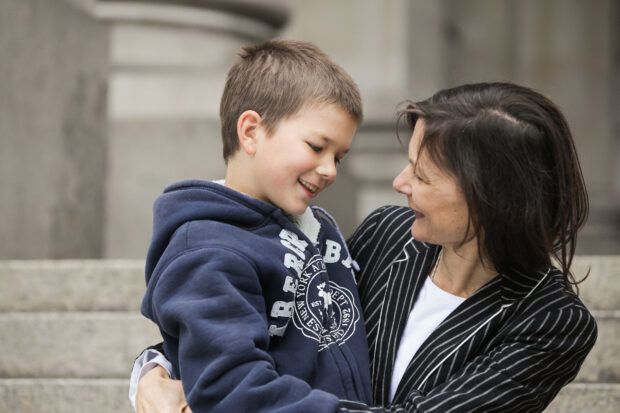I am a parent, a female parent. I have a son and a daughter. I am married and my husband and I share many of the parental responsibilities equally. When my son arrived two years after our daughter, we naturally loved him equally, as we do our daughter… we see them as equal. Yes, they have different qualities because of their gender and who they are in essence, but at no point have we treated them as less or more because one is a girl and the other is a boy.
It is not about the sort of equality where we push boys to be passive, or get girls to compete with boys, it is an equality where both genders are free to express themselves as they feel is true – no pressure or pictures or roles, rather allowing them to unfold with an understanding that both genders are equally significant and have their own expression and yet are, in essence, of the same origin.
However this is not common in the world… yet. Why are we still so caught up in roles, pictures of the way we need to act in our genders and in how we parent boys differently to girls?
I have frequently heard young boys being told to toughen up, not cry, to like fighting games and super heroes, to beat others in races or games, that they are no good at looking after their home, that it is normal to be rough, not want to be tidy, to not want to look after another person, to not wear pink, nor like flowers or beauty.
Does a 3-year-old boy not hurt the same as a 3-year-old girl if they fall on their knees? Does he not stare in joy at a flower opening up, enjoy the nurturing quality of a lovely shade of pink in his jumper, or snuggle up and enjoy the big caring arms of a parent?
Where did we get the idea that we support our boys by perpetuating these ideas; that boys should not show how they feel if they get hurt, that they need to harden up, not enjoy beautiful things, be aggressive, be physically dominant and win to get ahead?
A question for us as parents and mothers: what kind of men are our boys growing into when we role model in such a way?
My son, like my daughter, is gentle, so sweet, sensitive, caring, playful, enjoys beauty and order, with things being put away neatly. He is understanding, aware of others and when he has fallen, bumped, tripped, or felt fear in his life, I have my arms open equally with care and support, as I would for his sister.
If my son falls, he has the same physiological responses as my daughter does: his skin tears, there may be blood, bruises, tears and shock. Many of us adults respond in entirely different ways if this incident occurs to a boy rather than a girl; with a boy you often hear parents suggesting not to cry and to get up and toughen up, rather than offering a cuddle and care.
I have heard many conversations between women that are about the kind of men they would like to be with, or how their man is not fulfilling their idea of what makes a ‘real’ man.
Some criticism includes that men are:
- Messy, and do not clean up after themselves
- Irresponsible around the home
- Rough and careless
- Insensitive
- Can’t talk about their feelings
- Not gentle
- Do not understand their female partner
- Competitive and trying to get the upper hand
- Distant and distracted by hobbies
- Aggressive and dominating.
But hang on one moment, haven’t we as parents just endorsed all of these habits from a very young age in our boys? We normalise habits in our boy children that become exacerbated ways of life and habits into adulthood, and then we criticise our men for behaving in these ways.
Do we really think that these habits are set through our gender distinctions and not through habitual cultural stereotyping and parenting, when all we need to do is observe a young toddler at a play group to observe these behaviours, traits and habits being instilled from a very young age? We, as mothers and role models, have a significant responsibility in how we support boys to become the true men that they are naturally born to be and are.
My young son is growing into an extremely loving, strong, steady and expressive young man who is not imprisoned by what society says he should be. He is very free to express who he is through what he feels is true within him. He is a boy, but as a parent it is not up to me to tell him what it means to be a certain ‘type’ of male, nor the man he should be in this life. That is for him to discover, express and choose.
I know from conversations that some parents and mothers fear that their sons will be hurt or excluded if they do not conform to what a man is supposed to be, so they make sure they encourage them to learn to not show their feelings and tell them to toughen up in the hope that this will enable them to get through life with less suffering and pain. This is without doubt one of the most disabling choices we can make as parents – to toughen up our children. This cuts our children off from feeling, which is in fact our ultimate strength. In choosing to not feel, we disconnect from who we truly are, and then there is nothing but sorrow, disconnection and a functioning way of being, rather than a truly fulfilling life.
We do not protect our sons when we seek this as a remedy – we instead perpetuate the status quo that does not support either gender. We are all born with a precious tool for life, our bodies. When we harden up and disconnect through not wanting to feel things, we are not able to connect so deeply with our bodies. The body naturally supports us when we are connected to it and when we cut off or numb ourselves, we are less able to express how we are feeling, and so neglect to truly care for ourselves or others.
My son may cry when he is punched, trips or is talked to in an aggressive way; he may at times feel isolated and not be accepted in a group because he does not join in the competition, fighting or name calling that is involved; he may feel the pressure to conform and join in with what is presented as ‘normal’ behaviour for a male. This is his choice; I do not make judgment either way, but I do take my job seriously as a role model and counsel as he grows and develops. I will be responsible and offer guidance and support as he encounters these pressures throughout life. I significantly will always be open to who he naturally is to support him to explore and hold these qualities as he so chooses.
As a parent I take this into consideration in everyday parenting – how am I within myself, what is the quality of our relationships, how my children are flourishing, are they steady and confident within themselves, do they feel free to communicate how they feel? These considerations determine the way I am with them as a role model.
In the long term, it is important to consider how I raise and support my son now. How will he develop in life, how will he react or respond to his experiences, will he feel confident and able to enjoy being himself and will he be able to engage in meaningful relationships, expressing the qualities he was naturally born with?
It is clear that supporting him to honour what he feels, confirming / encouraging the expression of his natural sensitivity, care and gentleness will enable him to find his way with these super powerful qualities intact and this can only support him and others. These qualities are often underestimated in society and often derided in a man. It does not make a man weak to be open to feeling what is going on in the world, within his body, in his relationships – it is a strength and benefit for himself and all others.
We are here to offer support and raise our children. We are guardians in their lives; our purpose is not to control, own or pander, it is to support them to make choices that offer the freedom to express, be responsible and empower themselves so that they live meaningful lives of purpose and value within their own sphere and within society.
By Anonymous.
Further Reading:
It’s a Boy! What is true gender equality?
Stitched Up
Gender based violence – where does it begin? Do we really want to know?
Raising Boys – Are we Imposing on Them?





